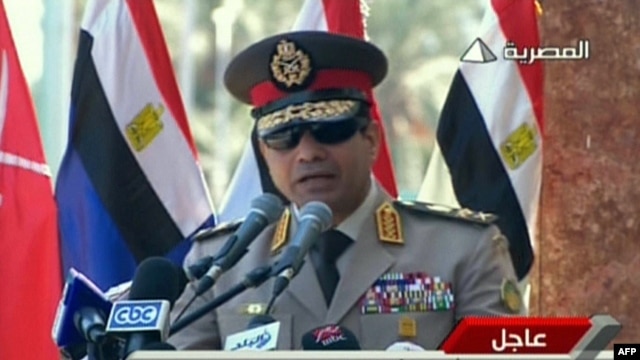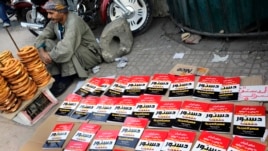
FILE - An image grab taken from Egyptian state TV shows Egypt's army chief General Abdel Fattah al-Sisi giving a live broadcast calling for public rallies to give him a mandate to fight "terrorism and violence."
January 06, 2014
In
recent weeks, Egypt’s military-backed government has introduced new
measures to crack down on the Muslim Brotherhood. It has labeled the
group a terrorist organization, and has also detained Al Jazeerah
journalists said to be backing them. Civil libertarians have criticized
the moves. But others say they’re necessary as the country heads
toward a constitutional referendum and elections.Despite the measures, protests continue in some towns and universities.
One Egyptian analyst says the crackdown is working -- and that protests to reinstate ousted Islamist president Mohammed Morsi have become smaller and less frequent.
Gamal Soltan, an associate professor of political science at American University in Cairo, questions the designation of protesters as students or journalists.
“ [When we mention] students or journalists,” he asserted, “we are talking about non-ideological groups. But [these] students, they are actually Muslim Brothers, and unfortunately, Al Jazeerah has been an integral part of the conflict in Egypt. It has taken sides. The situation has changed, and it is now on the wrong side.”
He says reconciliation with the Muslim Brotherhood is out of the question for the time being. He says the government’s policy is to redefine political Islam – by excluding the Brotherhood but allowing Islamic moderates such as the Al-Nour party to be on the ballot for parliament.
Soltan says people want stability.
“The majority of the people,” he said, “tend to support the new constitution and want to restore normalcy. Most are hungry for a kind of a strongman, a strong government to be able to bring order and peace and to put the economy back on track.”
Constitutional referendum
Said Sadek, an affiliate professor of political sociology at American University, says the Muslim Brotherhood is using protests and riots to derail the referendum.
“If there is a high turnout like 25 million out of 50 million,” he says, “this would be the official death certificate for the Muslim Brotherhood and the Morsi regime. The Muslim Brotherhood has been in existence since 1928; its failure would affect other movements in the Islamic world.”
Temporary measures
Sadek says the government’s increased powers to detain and arrest are temporary, and may well change when, in his view, the Brotherhood is defeated.
“We are in exceptional circumstances,” he says, “and you must take lots of measures. Our neighboring countries are failing states and now there’s an internal organization that wants to destroy our army and police to exert whatever [power] they like through their secret militias...there are no human rights for those who don’t believe in human rights.”
Read More Here








No comments:
Post a Comment
Hello and thank you for visiting my blog. Please share your thoughts and leave a comment :)